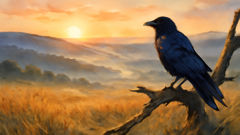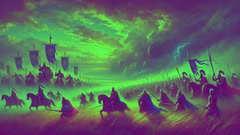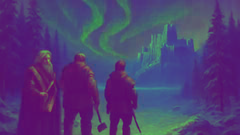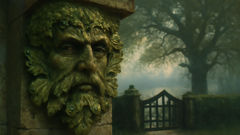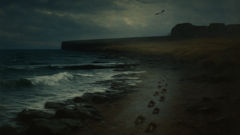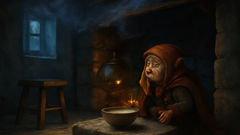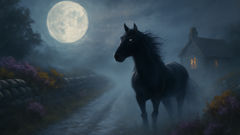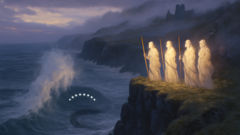Introduction
On the edge of the map where the television towers of the towns fade into the wild blue of prairie morning, a raven named Kichi watches the world shrink into darkness. The people say light comes from the sun and the stars, but in this corner of the United States, where rivers braid themselves with cedar smoke and the highway hums like a distant drum, the night felt heavier than a blanket left on a doorstep all winter. Kichi, with feathers as black as a spilled jar of ink and eyes that remember the sweetness of corn and the sting of winter, learned to listen to what the dark was trying to tell him: that night, if held too long, can dull courage, dull memory, dull the fire in a child's chest. The trickster in him, born of ancient stories and stubborn curiosity, began to ask a sharper question: What if light could be borrowed, reshaped, and shared, not merely owned? So he set out to test the edges of dawn, to walk across the long breath of the shadowed land, from the mesas of the Southwest to the marshlands where reeds whistle like old storytellers. He did not seek praise, only a way to wake the world, to remind it that even a darkness too thick to walk through could be thinned by a clever plan and a patient audience. In the chronicles of this land, myths are not shields but ladders. They climb into our days, inviting us to act with cunning, to forgive missteps, and to imagine a future where light is a common deficit we all share the responsibility to repair. The Tale of the Raven begins with a whisper, a promise, and a risk that glitters like frost along a fence line at dawn. And it will end not with a triumph shouted from a hilltop, but with a quiet, stubborn dawn that refuses to be erased. Long after the first spark of sun touched the cornfields and the city neon blinked awake, elders would tell younger ones that the sky itself had learned to borrow and repay, that a good trick is tempered by responsibility, and that the light we crave was not won in solitude but earned by many small acts of courage when the evening grew heavy. In this way, the introduction gestures toward the heart of the myth: a daring creature, a generous audience, and a country listening for a dawn that belongs to all.
The Whispering Shadow of Night
Night gathers over the plains as if the dark itself had learned a new grammar. The wind moves with the patience of old storytellers, and in that wind, Kichi hears a language older than the cities, a dialect spoken in the hush between owl calls and distant truck engines. He walks on a path where the ground remembers footprints of generations, where the scent of sagebrush and rain lingers on the air like a memory reclaimed. The valley holds its breath; even the river seems to pause in its wooden arc to listen. Kichi does not fear the night because fear is a spark that can be fed into a flame of action. He has learned to wait, to observe, and to question what night asks of him. When a night bird sings a note too bright to ignore, he shifts his weight, tilts his head, and asks a question that will become the pulse of his legend: what if the darkness itself could be persuaded to trade one of its heavier truths for a gleam of daytime mercy? The idea enters him not as a plan but as a dare. It is a dare that travels on wings, a dare carried from a hundred conversations with coyotes, with the salt of the sea some nights reach, with the patient, unhurried drumbeat of the North American heart. The people of this land endure shadows not only of light but of memory—times when crops failed, when winters came early, when the town finally learned to share a single lantern in the main street. Kichi listens to those stories and notes how a village, a family, a grandmother’s recipe for warmth, can become a map of resilience. In the margins of those stories, the raven discovers that night is not simply absence but a presence of possibilities, a canvas on which one could sketch a new dawn. The first decision is quiet, almost invisible: to test a what-if that could alter the geometry of day and night for everyone who depends on the rhythm of the sun’s return. His eyes, glinting with stubborn humor, begin tracing a route toward the sky, toward the places where light starts its long climb into the world.
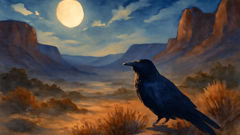
From this seed grows a season of scheming that is less about deceit and more about responsibility. Kichi is not a simple thief; he is a craftsman of risk, a designer of consequences who understands that every act in the dark casts a shadow long enough to reach the far corners of a valley and beyond. He watches the first pale glow of winter constellations fade behind a bank of clouds and notes how people gather, not to condemn him, but to wonder what truths a trickster might reveal if he finally chooses to share his dawn rather than hoard it. The night takes on a personality in his mind—a patient antagonist who believes in testing limits and a patient ally who believes in the power of a second chance. If there is a moral here, it is the balm of curiosity tempered by accountability; the raven’s intelligence is not only in cleverness but in restraint, and the restraint in turn will become his greatest test. As the night moves toward a late hour when crickets turn quiet, Kichi gathers the threads of his plan—threads that feel at once fragile and unbreakable, like the chorus of a wind-blown Indian prayer flag in a canyon. This is his invitation to the audience—watch closely, for the night’s fabric may loosen enough to reveal a seam where light can slip through, but only if hearts stay awake to its potential.
The Shadow’s Counsel
In the village edges where streetlamps blink to life and a grandmother’s stories keep the fire of memory bright, Kichi seeks counsel from a different kind of advisor: the shadow that moves when people blink. Shadows are not mere absence here; they are transcripts of moments when courage was chosen, when hands reached out to steady a frightened neighbor, when a boy learned to walk again after losing his way. The raven’s approach is soft—no clamor, no proclamation—because the strongest magic in his world arrives not with a roar but with a sly, almost affectionate patience. He finds in the shadow a quiet mentor who has watched ages unspool over a fence post and a windmill, and who knows how a single well-timed misstep might bloom into a harvest of dawn-light. The counsel is paradoxical: if you borrow light, you must also lend responsibility, you must return what you steal not with a receipt but with a covenant. Kichi nods, tasting ash of old fires and the sweetness of hail on pine needles, and he begins to sketch the architecture of a gamble—one that could tilt the balance toward illumination or leave the world to grope in more darkness than before. He tests a line on the air, a line that would thread together sun, moon, and stars through a single daring thread and pull until a skylight opens above the earth. The shadow hints at consequences: the more the daylight is borrowed, the more the night will remember the debt, the longer the dawn will take if the city fails to share the burden of stewardship. In that quiet moment, the raven acknowledges his own hunger for meaning; the trickster’s appetite for mischief now has a different target: a dawn that belongs to all, earned by all, and guarded by the community that gave him a place to dream.
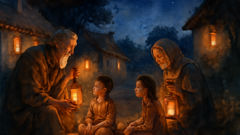
The night listens as if it fears losing a friend, and Kichi, listening back, feels the tremor in the air—the tremor that tells him a decision is not far off. The plan remains a rumor in the lungs of the wind, a kind of heartbeat that grows louder as he moves from story to story, from porch to porch, from the roadside cafe where a pianist composes a tune about a merciful sun, to the riverbank where a fisherman shares bread with a star-swept dog. He learns that truth travels in communities as surely as light travels across an open field, and that even the most audacious dream can be tempered by listening to those who fear the consequences of change. This is the moment when the trickster begins to understand that to wake a world, you must speak the language of care as fluently as you speak the language of cleverness.
The Morning Hush
The night loosens its grip just enough to reveal a seam in the dark—an edge where dawn can seep through if approached with respectful precision. Kichi gathers the last of his nocturnal allies—the wind that knows every valley, the coyote who has learned to count stars as if they were numbered grains of sand, the old river that remembers when the sun last walked this land with a child on its banks. He meets them on a ridge that overlooks a town that has learned to depend on both the bright arc of the sun and the stubborn glow of a cigarette lighter in a late-night parking lot. The plan is not a storm; it is a patient, cunning, almost ceremonial ritual that requires consent in the form of trust. He does not whip up a tempest; he negotiates a truce with the sky. He asks permission from the constellations to borrow a little light, not to own it, but to temporarily lend it so that people can remember what dawn feels like when it belongs to them all. The night, generous and wary, glances at the river and the mountains and finally offers a hesitant nod. The arc of a sunbeam becomes an avenue; a pale crescent moon becomes a doorway; a handful of bright stars become pinpricks of signal showing the way. The world inhales, holds its breath, and then releases as a whisper: perhaps this is possible, perhaps this is the shape of hope, perhaps this is the moment when trust, not force, makes a daylight path. Kichi steps into that path with the light threaded through his tail like a living wire, a cable carrying caution and delight in equal measure. He invites the people to watch not for his triumph but for the possibility that dawn can arrive through a shared vow—a vow that says, we will take what we need to live, and we will give back what we can to keep others from living in perpetual night.

Conclusion
When dawn finally stretches its fingers across the earth, it does not arrive as a single shout but as a chorus sung by the people, the birds, and the land itself. The Sun, Moon, and Stars, having descended for a time, reveal themselves not as trophies but as reminders that light is a shared currency. The town learns to decide together when a night is allowed to linger and when a day must be cherished by all. Kichi, with his clever beak and a heart tempered by the pull of consequence, discovers that a true trickster is a teacher who knows when to stop playing and start listening. The light returns with a soft insistence, and the fields wake with a fragrance of rain and seed. In the markets, the elders tell stories not of a thief, but of a guardian who made a bargain with humility: to protect light, we must protect one another. The tale does not end with triumphal fanfare; it ends with a quiet, enduring dawn that reflects in the eyes of children who now run toward the day with the confidence that they, too, can shape the light. For in the end, the sky’s generosity rests on the willingness of a crowded world to keep faith with its promises—and in that faith, a single raven becomes a legend that refuses to dim.

